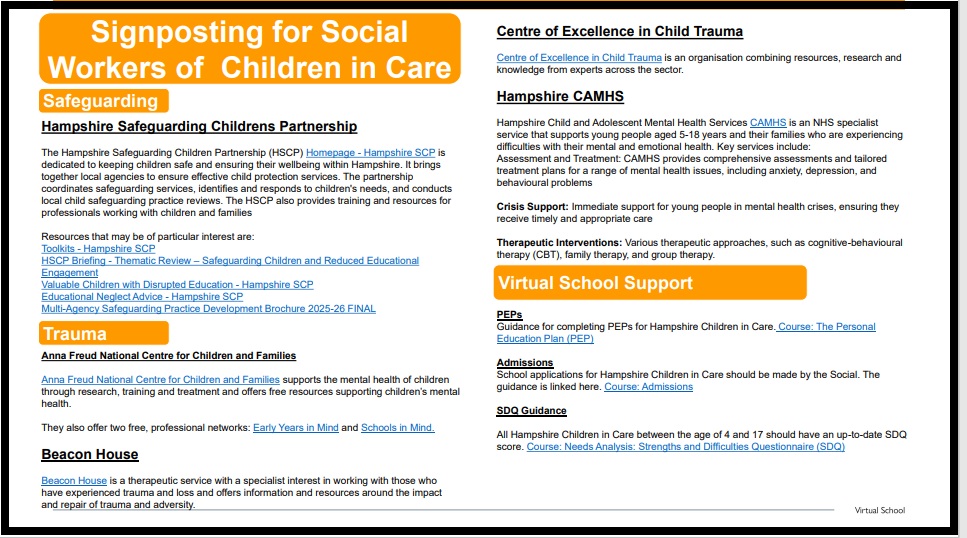Looked-After Children (LAC)
Section outline
-
This brief video outlines key information about looked-after children in our Post 16 cohort and how social workers can best support their education.
Supporting the Education of Children in Care (CiC)
Children in care face unique challenges that can impact their educational progress, outcomes and development. As part of the role of the Virtual School Head, there is a focus on improving outcomes for all children in care, recognising education as a key protective factor in their lives.
Key Aims
- Ensure the educational needs of children in care are recognised and prioritised
- Support consistent attendance recognising that being in education helps keep young people safe
- Raise aspirations and close the attainment gap for children in care
Click here to access important resources, including:
-
- Collaborate effectively with education professionals (e.g. Designated Teacher/Designated Lead, SENCo, DSL, Key Person) to ensure joined-up support
- Organise and lead the PEP.
- Ensure completion of the Strengths and Difficulties Questionnaire (SDQ) for young people up to the age of 17.
- Ensure the Virtual School are aware of any changes to education setting in a timely manner, pro-actively seeking advice when needed
- Prioritise relationships - build trust with the child and their carers/parents, and ensure their voices are central to planning and decision-making
- Share information proactively to support education planning, including personal education plans (PEPs)
- Advocate for high aspirations - ensure education is part of every conversation about the young person’s future
-
- Know and track the CLA cohort
- Ensure collaboration between key staff (Designated Teacher/Designated Lead, Key Person, DSL, SENDCO, safeguarding governor/committee member/manager)
- Ensure Personal Education Plan (PEP) is completed
- Understand individual needs and barriers to learning, using available needs analysis tools
- Prioritise CLA in planning, interventions, and support
- Build strong relationships with the child, ensuring child voice is at the centre of any decisions made
- Ensure child voice is a common thread throughout the PEP
- Complete the Strengths and Difficulties Questionnaire (SDQ) when requested up to the age of 17
- Work in partnership with carers/parents, social workers, and the Virtual School
-
- Partnership working with schools, early years settings, and social care
- Training and development for professionals working with CiC
- Targeted, data-informed projects
- Advice, guidance, and access to free tools and resources
Note: The Virtual School does not replace the role of the school/setting or social worker in direct support or intervention, but works strategically to improve outcomes for children in careFunding:
Children Looked After (CLA) aged 16 to 19 in England are eligible for financial support through the 16 to 19 Bursary Fund, specifically under the vulnerable groups category. This bursary provides up to £1,200 per academic year, helping to cover essential education-related costs such as travel, meals, books, equipment, and specialist clothing. The funding is paid directly to the student or used in-kind by the institution to meet their needs.
Eligibility includes being in care, a care leaver, or receiving certain benefits in their own right. Institutions are required to assess each student's actual financial needs rather than applying a flat rate.
Local authorities, Virtual School Heads, and education providers play a key role in identifying eligible students and ensuring they receive the support needed to succeed in further education.
16 to 19 Bursary Fund guide: 2025 to 2026 - GOV.UK

